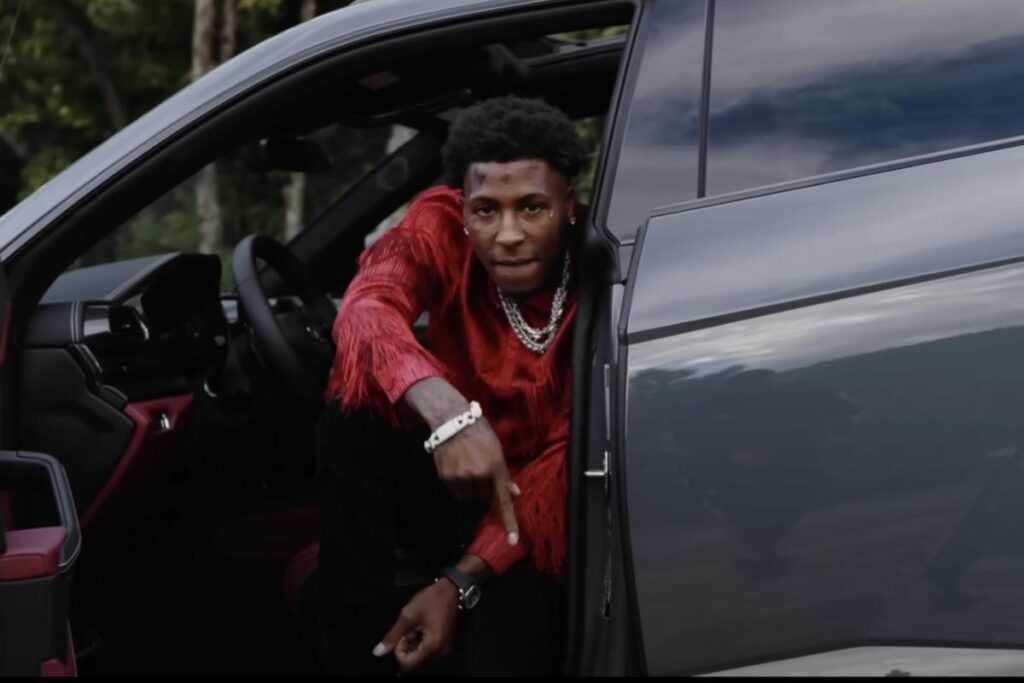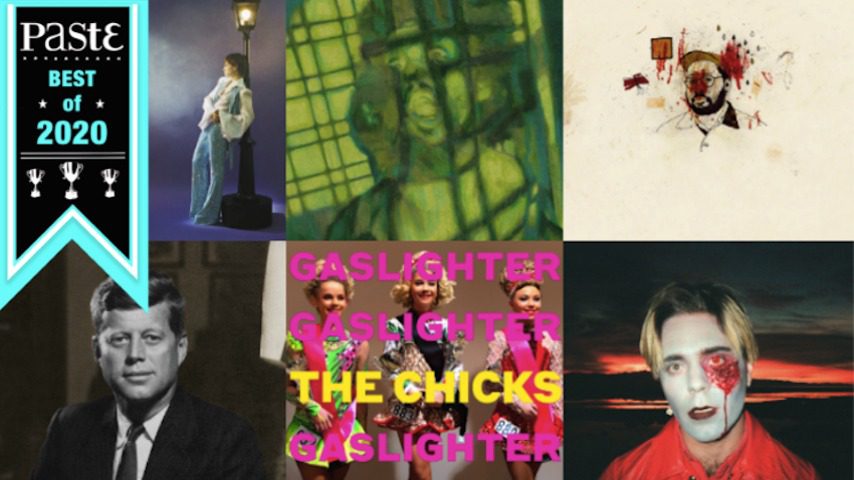Jason Isbell is widely considered to be one of the best songwriters working. And when he’s playing with his band the 400 Unit, he’s also arguably one of the fiercest forces in rock music. But very often his best songs aren’t the roaring rock numbers (but those are great, too—the man doesn’t really have a stinker anywhere in his discography): They’re the tender, intimate stories crafted from both real-life experiences and mined from Isbell’s overactive imagination. They’re also frequently all-encompassing summaries of the human condition, or, more recently, something bordering on protest music. Each of his solo albums, 400 Unit records or songs written with his first band The Drive-By Truckers, is a masterclass in narrative.
The musician and ace bandleader is lauded across the music industry and the country at large for his skills as a lyricist and singer. But, being from Alabama, there’s a certain pride in knowing Isbell keeps things close to home. He’s a country singer at heart. Right up there with Nick Saban and Hannah Brown, he’s one of America’s favorite and most trusted Alabamians (even if he does call Nashville home now). While his 2013 solo album Southeastern is considered to be his biggest splash (and, depending on who you ask, his best output), Isbell has a catalogue full of intimate, beautiful, dependable music. I’ve not yet found an album of his that I don’t want to frequently return to.
While a list of best songs could include almost every track he’s released, here are 20 that are close to my heart. I can’t offer the ultimate, end-all-be-all ranking of Jason Isbell songs, but I can point the uninitiated among you to these songs as a damn fine starting point for one of the best musicians in Americana and beyond. If you’re already a fan, this list probably won’t hold many surprises, but it holds a lot of importance. I hope you find something to love here if you haven’t already. Jason Isbell and the 400 Unit’s new album Reunions is out Friday, May 15.
20. “Flying over Water”
This is one of those aforementioned rockers. Maybe the narrative is a little slippier (and a little more classic-rock-style metaphorical) than most of Isbell’s songs, but that doesn’t make it any less affecting. I get chills every time I hear Isbell sing in his gentle roar, “Take my hand, baby we’re over land.” In the face of fear, Isbell still preaches perseverance, faith and finding strength in one another.
19. “Alabama Pines”
This is Isbell’s version of “Take Me Home, Country Roads,” and it’s just as good and true as John Denver’s twisty journey through West Virginia. Isbell asks, “Somebody take me home through those Alabama pines” before dropping little glints of wisdom like “No one gives a damn about the things I give a damn about / The liberties that we can’t do without seem to disappear / like ghosts in the air / When we don’t even care, it truly vanishes away.” And the song has a lovely locomotive country-rock rhythm to match the lyrics’ mobile nature.
18. “Chicago Promenade”
I unfairly tend to forget about Sirens Of The Ditch, Isbell’s first solo album released in 2007, and while it’s not as deeply felt as Southeastern or Something More Than Free, it finds Isbell embracing his country roots in a way he hasn’t really since. “Hurricanes and Hand Grenades” is a country-classic New Orleans bender, “Grown” is a sweet soft-rock-inspired love song and “Chicago Promenade” is the rare piano ballad that morphs into a striking rock track. It’s simple, but it works like a precursor to so much of what Isbell would release going forward. “There’s so much more to suffer through / Before I meet again with you,” he sings. “Chicago Promenade” is right at the intersection of grief and love—classic Isbell.
17. “If It Takes a Lifetime”
Sometimes it feels like growing up really does “take a lifetime,” and no one sums up that adult imposter syndrome better than Isbell on this Something More Than Free jingle. It’s all about leaving your roots and finding them again (“I got too far from my raising, I forgot where I come from / And the line between right and wrong was so fine”).
16. “Decoration Day”
The title track from one of the greatest southern rock albums this side of Eat a Peach, “Decoration Day” is the tale of an ongoing family feud. Isbell played with the Drive-By Truckers from 2001 to 2007, and they uncoincidentally recorded some of their best work during that time. “Decoration Day” sticks out from the bunch for its blunt assessment of violence, searing lamentations and spitting guitar solos.
15. “24 Frames”
There are too many pennies for your thoughts to count in this Something More Than Free story, but the one that’s repeated and reorganized the most revolves around God and what that really means. “You thought God was an architect, now you know / He’s something like a pipe bomb ready to blow,” Isbell sings, later amending the verse to say, “You thought God was an architect, now you know / He’s sitting in a black car ready to go.” For a grooving rock tune, this song sure does have a lot of spiritual wisdom. And its overarching message: Hold on tight to everything you love, because it’s all fleeting.
14. “Dreamsicle”
One of the first singles from the 400 Unit’s new album Reunions, “Dreamsicle” sounds like a short story one might read in their southern lit class—in a great way. Isbell, singing with a newfound urgency, assumes the character of a child caught up in a turbulent family who just can’t seem to stay in one place. He dreams of growing up and getting the hell out of dodge: “I’ll be 18 four years from now / With different friends in a different town / I’ll finally be free.” And, amazingly, he doesn’t sound like an adult posing as a child. He just sounds like a young person full of uncertainty, but a little hope, too.
13. “Super 8”
This is one of the rare occasions in Isbell’s career where he starts the song with the chorus. Wasting no time, he sings, “Don’t wanna die in a Super 8 motel / Just because somebody’s evening didn’t go so well.” It’s a souped-up country rocker, as well as a kooky, character-driven southern tale. With several helpings of humor, Isbell’s hotel-hopping character recalls one wild night, Hangover-style. And while there’s darkness lurking beneath this story’s haha moments, it’s ultimately a just-for-fun rock song, full of Sunday-morning regrets.
12. “Something More Than Free”
On the title track from Isbell’s 2015 release, the singer is at his most brazenly blue-collar. Singing the role of himself, his father or anyone working an exhaustive, dead-end job, Isbell emits nothing but truth and sweat on this one. There’s also a great deal of gratitude here, despite any adversity, as he sings, “And I don’t think on why I’m here or where it hurts / I’m just lucky to have the work / Sunday morning I’m too tired to go to church / But I thank God for the work.”
11. “Traveling Alone”
“Traveling Alone” is so easy to understand, but it’s also dynamic. On the verse, “I’ve grown tired of traveling alone, won’t you ride with me?” you can hear Isbell’s wife and fellow 400 Unit player Amanda Shires singing and playing her fiddle for one of the first times in his career, and it’s a deeply touching arrangement. As so many of us become, Isbell was weary of solo journeys. The load becomes so much lighter when someone is singing alongside you.
10. “Last of My Kind”
This one’s for country kids everywhere. Isbell begins this song listing everything he (or his character) dislikes about the city slog, from the dirty streets to the lack of starlight to people’s disregard for the homeless. The man at this story’s center goes to college and can’t fit in, recalls the wisdom his parents imparted upon him and then wonders why it doesn’t all feel more tangible, wondering if he’s “the last of my kind.” It’s a beautiful twist on the small-fish-big-pond juxtaposition, with loads of heart.
9. “White Man’s World”
The song that notoriously sends the occasional angry audience member tearing out of the venue, “White Man’s World” is Isbell’s first real whack at a protest song. The 400 Unit’s album The Nashville Sound was released in 2017 following the national mayhem of 2016, and many of these songs capture the specific anxiety many were experiencing around that time. Here Isbell reckons with his privilege—both as a man and a white person—and does it with nothing but empathy and regret, especially for when he was “one of the guys.” It’s not up to just one person or group to end misogyny and racism and hate. He says it best: “We’re all carrying one big burden, sharing one fate.”
8. “Something to Love”
“Something to Love,” the cheerful adieu from The Nashville Sound, is equal parts honky-tonk and heartfelt. This is Isbell’s Irish blessing, and as he harmonizes with Shires, he leaves us with a chin-up message: “I hope you find something to love / Something to do when you feel like giving up / A song to sing or a tale to tell / Something to love, it’ll serve you well.” In the hands of another, lesser artist, it may come off as cheesy, but via Isbell, “Something to Love” is as earnest a goodbye as they come.
7. “Tupelo”
Maybe placing this song in the top 10 is a hot take, but I can’t imagine Jason Isbell without “Tupelo,” and I find myself returning to it almost more than any other singular song of his. It has just the right amount of twang and a few twinges of painful memories, too. But along with the pain comes lots of faith, albeit modest. All any of us wants is to feel loved and appreciated, and for this song’s protagonist, Tupelo, Miss., is the last frontier of acceptance. Plain-spoken and uncomplicated, “Tupelo” is just another way of singing the grass is greener over there. But sometimes gazing across the fence into lusher pastures is the only way to get through the day.
6. “Speed Trap Town”
There’s a reason this one of Isbell’s most popular songs: because it’s so damn relatable. Small towns are not new territory in country music, but as he does so often, Isbell here takes a well-covered topic and forces us to view it differently, clearer, even. Small towns can be suffocating for lots of reasons, but they’re even more dangerous when one’s family is falling apart. In this “Speed Trap Town,” someone is faced with the constantly swarming sea of familiar faces that follows one around in a small town, but he’s also dealing with an ill parent. Tragedy can make these small hometowns feel even more insufferable.
5. “Stockholm”
Before they would sing “If We Were Vampires,” Isbell and Shires gathered on this form-fitting duet. “Stockholm” is very much a continuation of the quieter “Cover Me Up,” which precedes it on Southeastern, but where “Cover Me Up” is about the quieter, more intimate fortresses we build within relationships to protect us from the outside world, “Stockholm” is a fortified exclamation of the power that new love can bring.
4. “Relatively Easy”
This song may ring especially true these days, when some of us are in no immediate danger, but still suffering in one facet or another. “Relative Easy” is Isbell’s way of acknowledging that compared to “people on a global scale,” most of us are doing OK, but that doesn’t mean that our pain is cancelled. Depression, specifically, is a major theme here, as the song’s narrator recounts losing a friend to suicide. There’s a lot to glean from this, but one of the most important takeaways could just be empathy: Everyone you meet is going through something, and while someone may be “relatively” happy, healthy, etc., it’s still important to be gentle with them, because you never know the full scope of their brokenness.
3. “If We Were Vampires”
There’s no doubt that “If We Were Vampires” is akin to “Cover Me Up,” but it also perpetuates a different mood entirely. “If We Were Vampires” mourns the temporary nature of everything—especially marriage, the stronghold that was explored and praised on “Cover Me Up.” While its title may suggest some kind of corny desire to live forever with one’s partner, Twilight-style, it actually acknowledges the briefness of marriage and cherishes it all the more for its brevity. Isbell told Paste upon the song’s release, “I started to examine my own notions about mortality, when I realized that to write a love song, you have to write a death song.” But sadness doesn’t necessarily reign on this “death song.” “If We Were Vampires” is a thoughtful acceptance of life’s shortness and a thank-you letter to the person you choose to grace with the bulk of that all-too precious time.
2. “Elephant”
This one is truly difficult to withstand without crying, but the visceral reactions that “Elephant” incites are why this song is so everlasting. It’s been called “the saddest song ever,” and while it’s certainly not chipper, there’s something very beautiful about the ease with which Isbell sings about life-altering topics such as grief, death and cancer. As this character is withering away due to cancer’s effects, everyone tries to ignore the “elephant” in the room and just make her final moments as joyful as possible.
1. “Cover Me Up”
It’s the song he plays at every set. I’ve actually lost count of how many times I’ve seen Isbell and his band in concert, and some of those times were short, rowdy festival slots, but he never skips “Cover Me Up,” even if the crowd is drunk and loud. Typically, once he plays the first few recognizable chords, folks quiet down and give him the reverence typically reserved for church or court. But when he sings the line, “But I sobered up and I swore off that stuff / Forever this time,” there’s inevitably a chorus of whoops and hollers. Maybe “Cover Me Up” isn’t exactly aligned with the sentiments behind “You won’t find yourself until you love yourself on your own,” but it doesn’t matter. This is Isbell’s and Shires’ story. They saved each other. While it’s undoubtedly a sweet love song, it’s also so much bigger than that, an end-all-be-all. There’s a finality to the line “Cover me up / and know you’re enough / to use me for good.” It’s impossible to truly peer inside someone else’s relationship, but the universality of “Cover Me Up” is representative of what makes Isbell such a truly great songwriter. Using the specifics of his own relationship, he wrote a song for all relationships.




